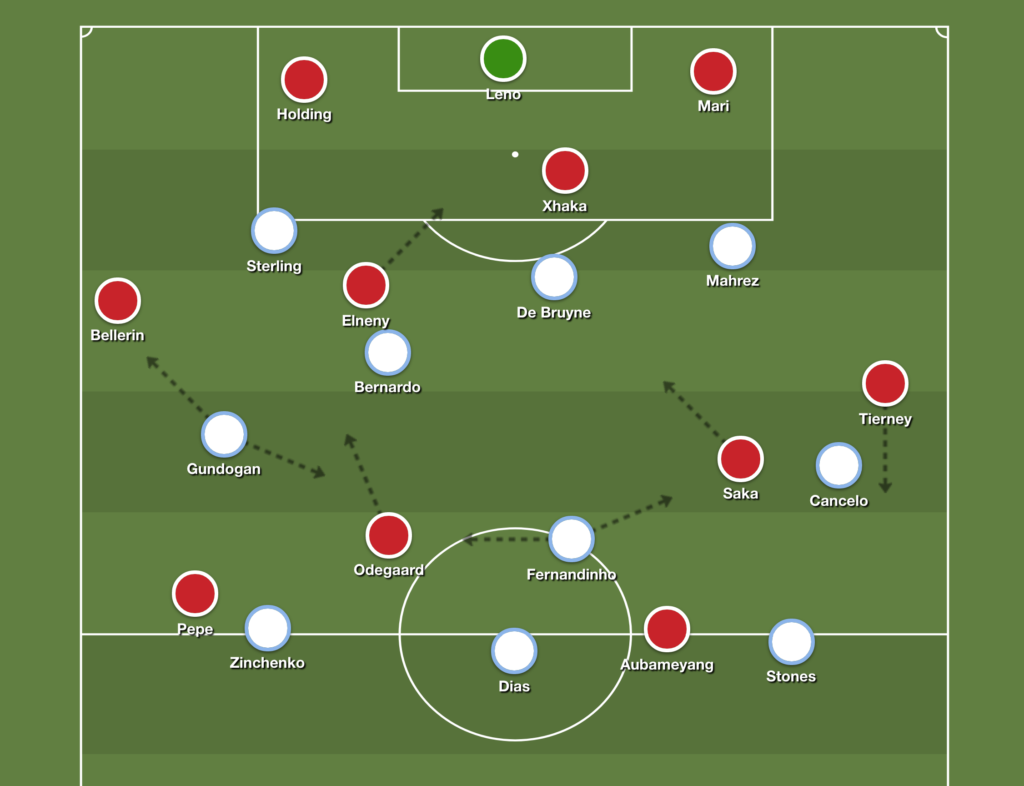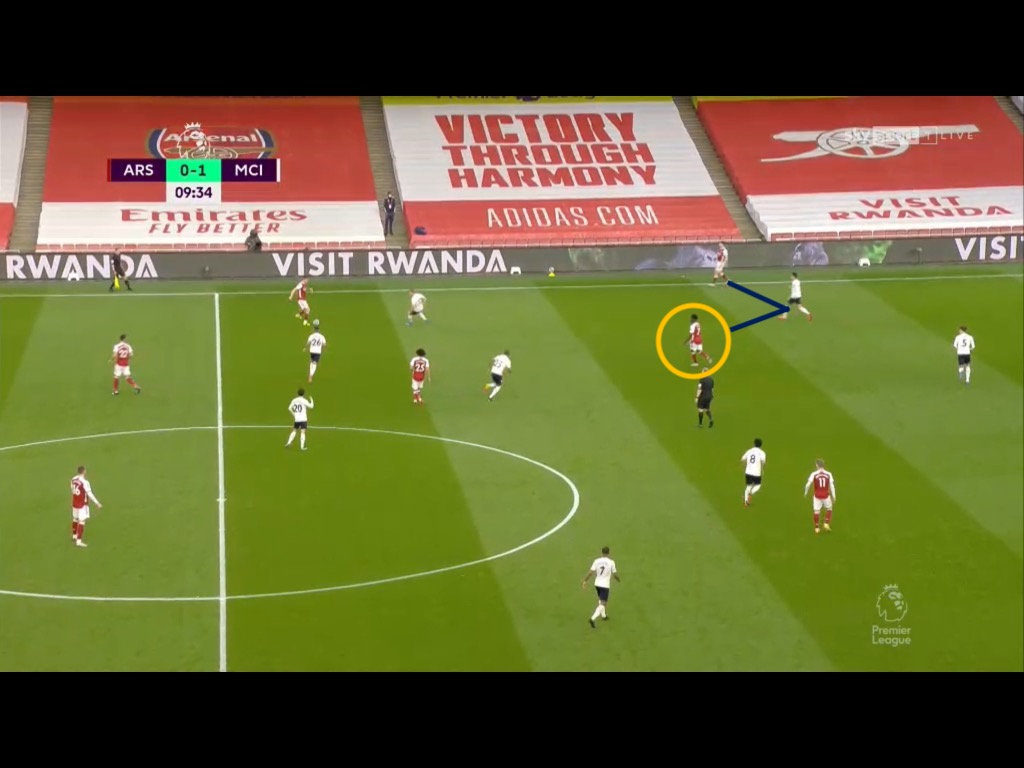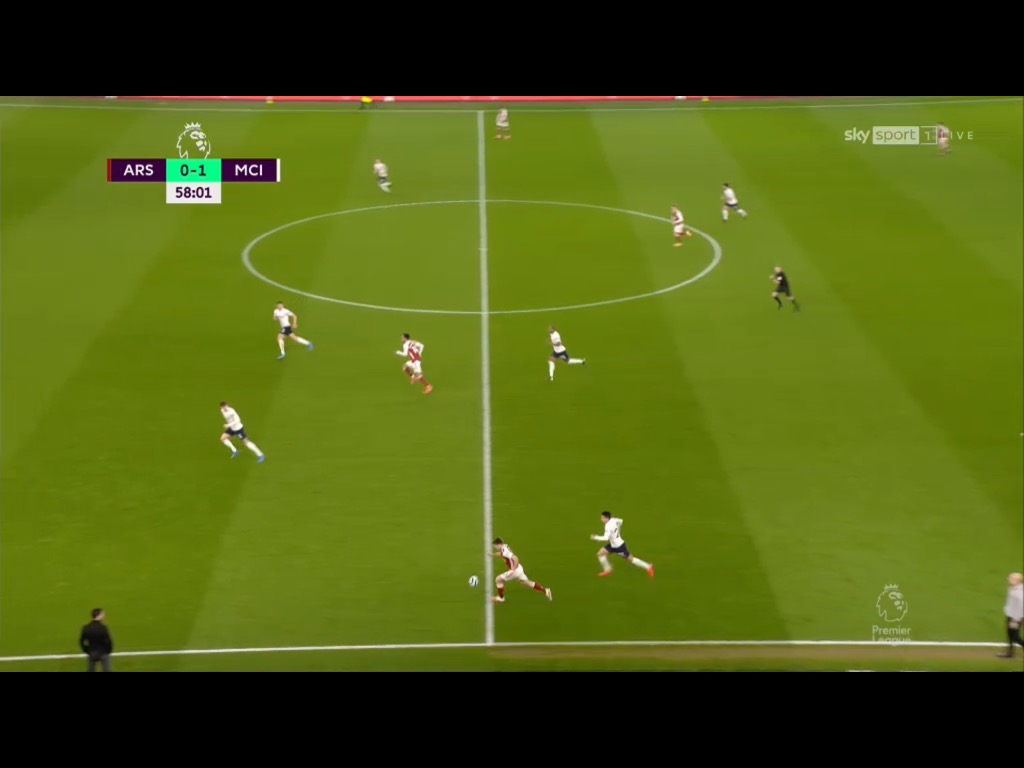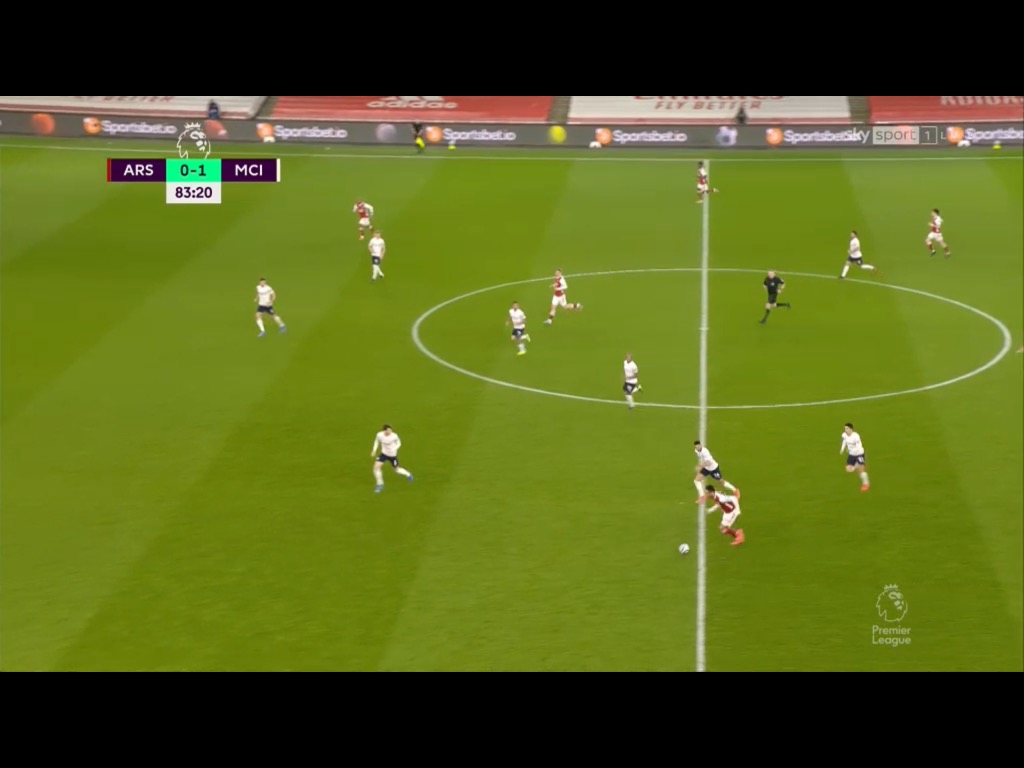Note: I’ve used yellow on some of the still images from the game where I have previously used red. This is because of a couple Arsenal fans who got in touch mentioning red arrows on the green pitch can be difficult for some with colour-blindness — let me know if there’s anything else I can change to accommodate more people!
“We got something [tactical] wrong, we talked about something and then didn’t do it in the first five or 10 minutes and they used the overloads down the side.” – Mikel Arteta
Manchester City don’t need any help to win, so getting something wrong and going behind within 90 seconds really is shooting yourself in the foot.
But that’s exactly what happened in the 1-0 defeat at the Emirates yesterday. Kieran Tierney was preoccupied by the positioning of Kevin De Bruyne or Bernardo Silva on a few occasions and pulled inside, allowing City to find Riyad Mahrez outside him with ease. Arsenal got away with it in the opening minute of the match, when Raheem Sterling couldn’t convert after Mahrez had found space out wide to deliver a ball into the box.
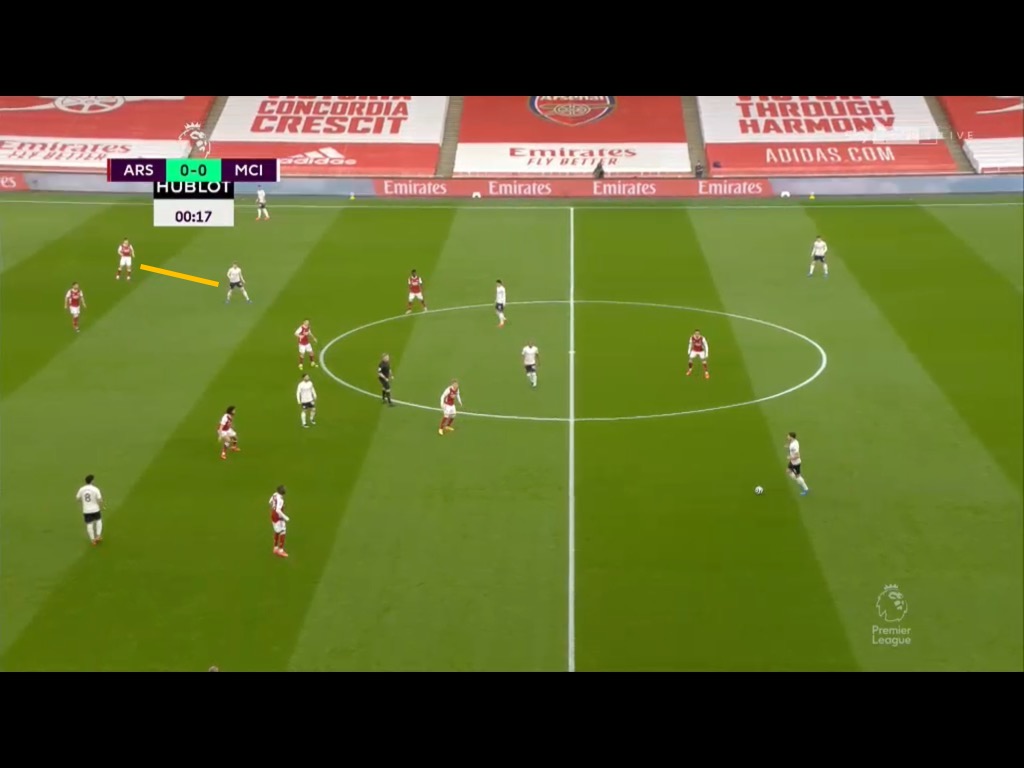 They didn’t get away with it again, with Mahrez hanging wide once more, De Bruyne’s positioning pinning Tierney inside, and the Algerian collecting a long pass and delivering an another fine cross for Sterling to nod home.
They didn’t get away with it again, with Mahrez hanging wide once more, De Bruyne’s positioning pinning Tierney inside, and the Algerian collecting a long pass and delivering an another fine cross for Sterling to nod home.
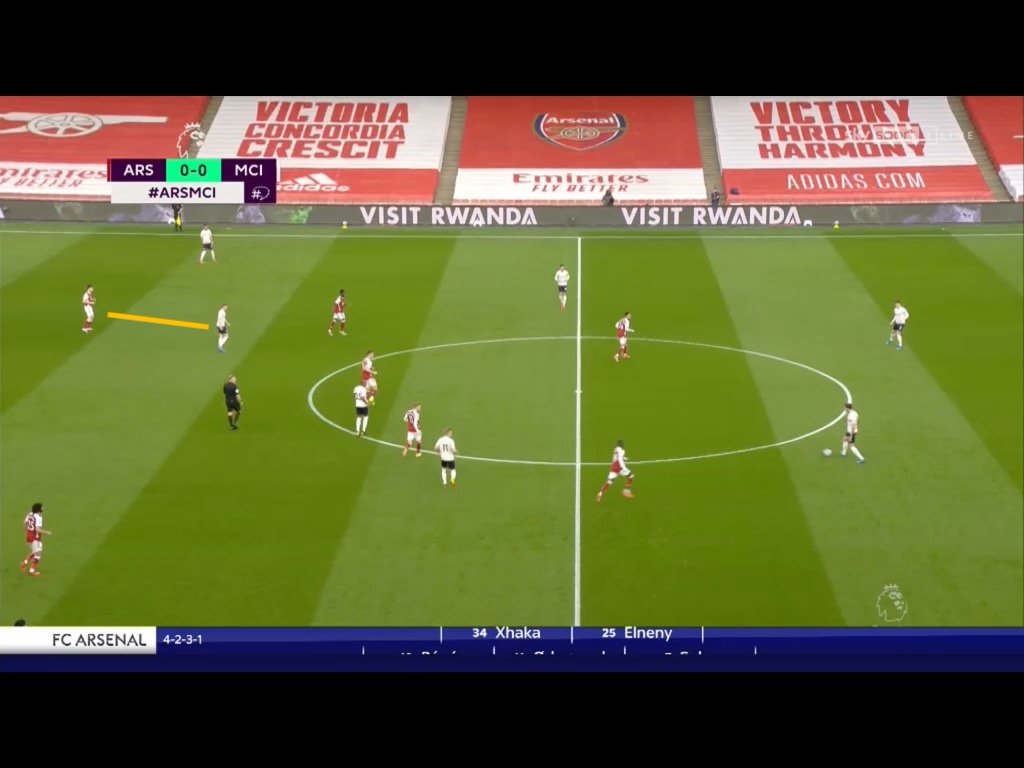 Advantage City, and they could smell blood.
Advantage City, and they could smell blood.
With five minutes on the clock De Bruyne and Mahrez switched, causing Tierney an identical problem, and the Belgian played Sterling through. Arsenal were hanging on and a battering was on the cards.
“It was a really tough game. We didn’t have the players that we used to play and create our game because Mikel is so clever and they make man-to-man in the build-up.” – Pep Guardiola
But the Gunners intelligently adjusted. Around 10 minutes into the game, Granit Xhaka took responsibility for the area in front of Tierney. It’s an unusual approach for a central midfielder to hang around in front of his left-back, but City offer unusual and intricate threats and they can require unusual solutions. From the 10 minute mark, Xhaka was checking his shoulder, ensuring Tierney wasn’t left with a decision to make, and allowing Bukayo Saka to stick to his role of sticking to Joao Cancelo, who has become integral to City’s play this season.
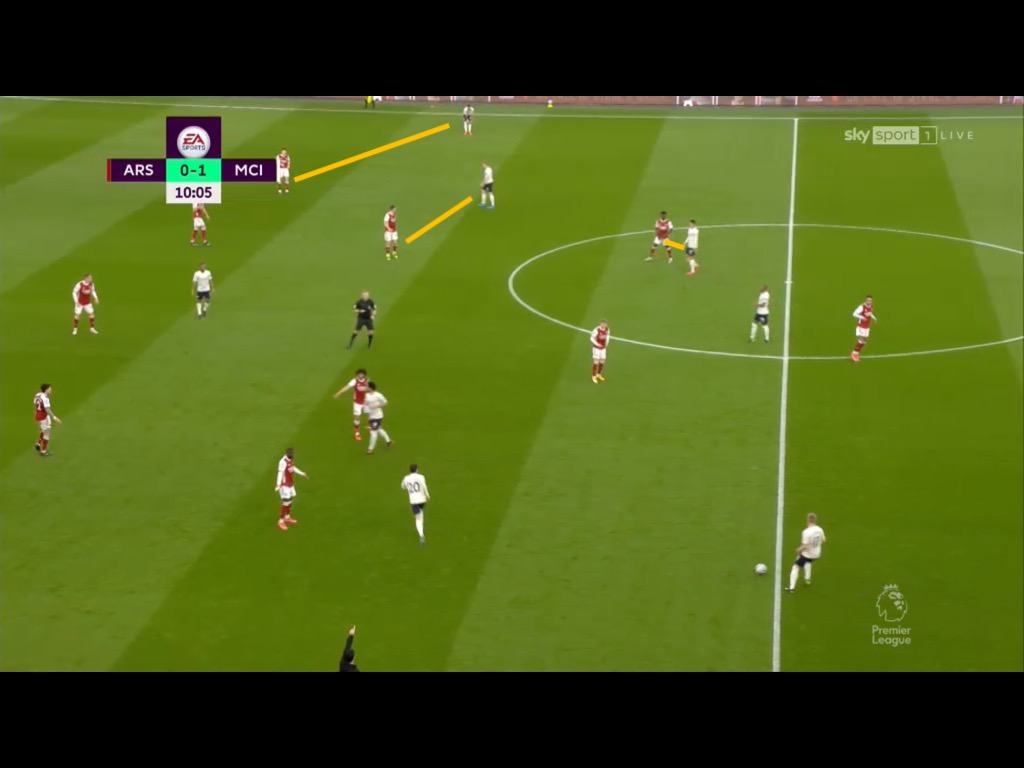 The right-back tucks into midfield and probes with both his running and his passing, a threat Arsenal countered well to leave Guardiola frustrated. For just the second time this season, Cancelo made zero passes into the box all game. He’s only had fewer touches in a game he’s started twice since his first appearance of the campaign.
The right-back tucks into midfield and probes with both his running and his passing, a threat Arsenal countered well to leave Guardiola frustrated. For just the second time this season, Cancelo made zero passes into the box all game. He’s only had fewer touches in a game he’s started twice since his first appearance of the campaign.
When Guardiola talked about Arsenal’s man-marking preventing City from using their players the way they usually do, he almost certainly had Cancelo in mind.
City’s loose positioning, incredible rotations, and quality on the ball meant they were still a threat at all times and Arsenal had to work hard (and get the rub of the green) not to be pulled apart by some fantastic moments but the response to the opening 10 minutes was excellent and City’s main route to goal in those opening stages was cut off.
Still, that electric, synchronised movement between Guardiola’s players can be impossible to defend at times and Arsenal did well to straddle the line between their man-to-man approach and making sure they weren’t pulled apart, with players communicating well, filling in for each other, and passing players on against some of the finest and most creative attacking football in the world.
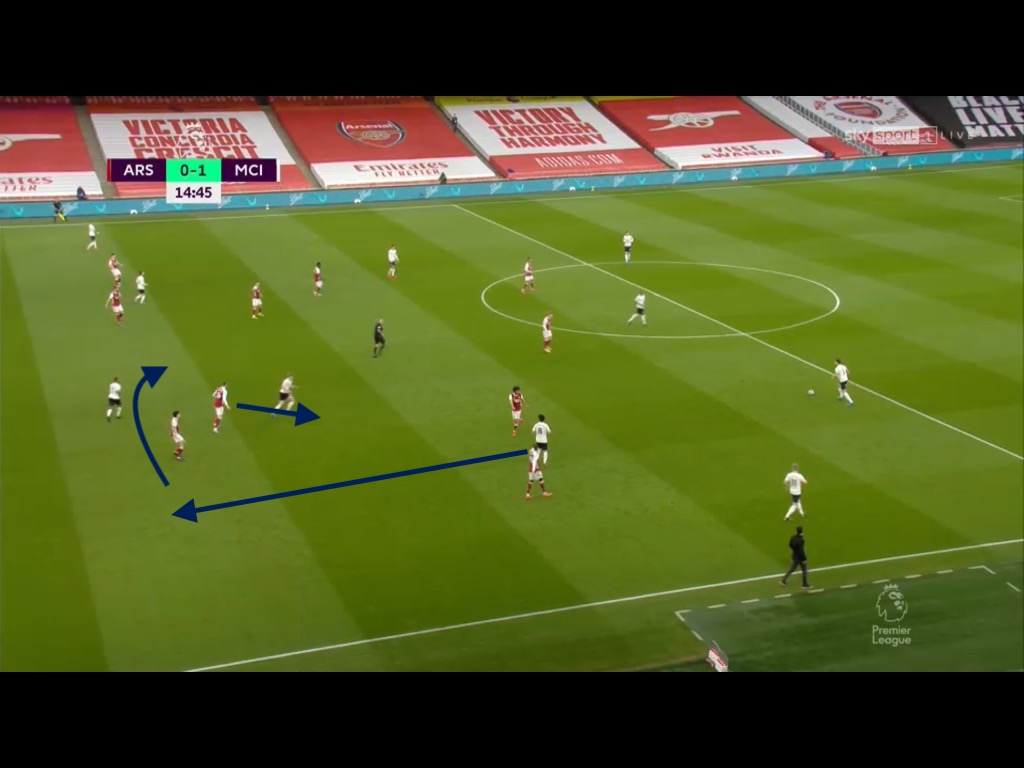 City especially looked to carve Arsenal open with deep runs between the centre-back and fullback, but the adjustment to make sure Tierney had support inside him worked well.
City especially looked to carve Arsenal open with deep runs between the centre-back and fullback, but the adjustment to make sure Tierney had support inside him worked well.
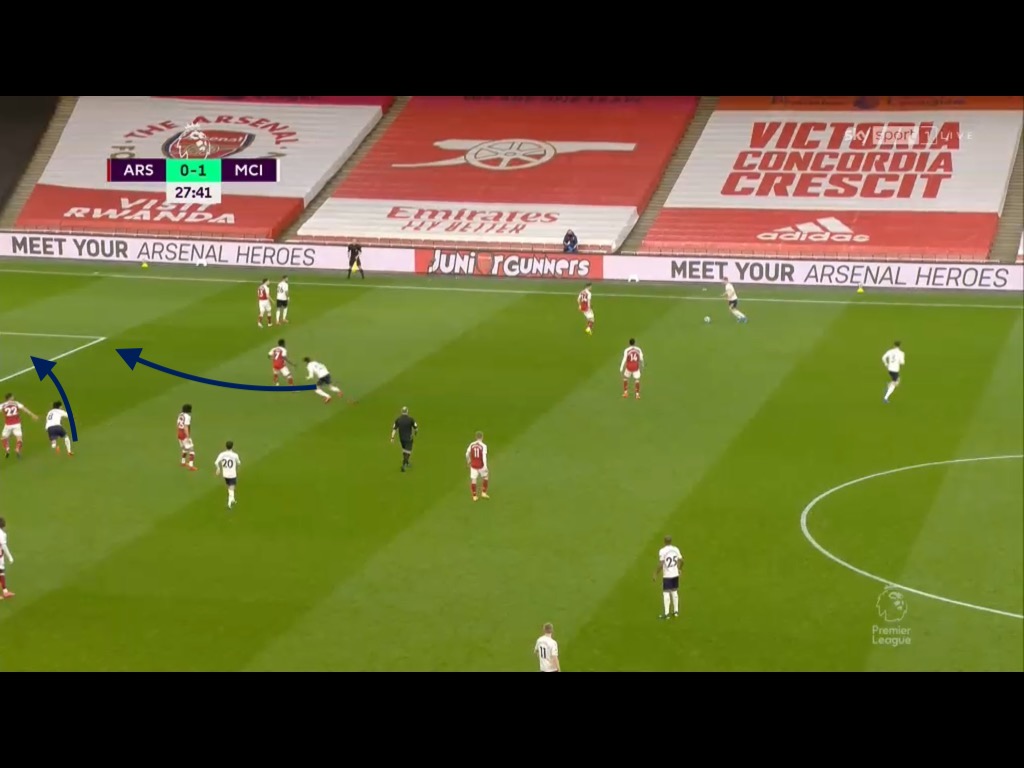
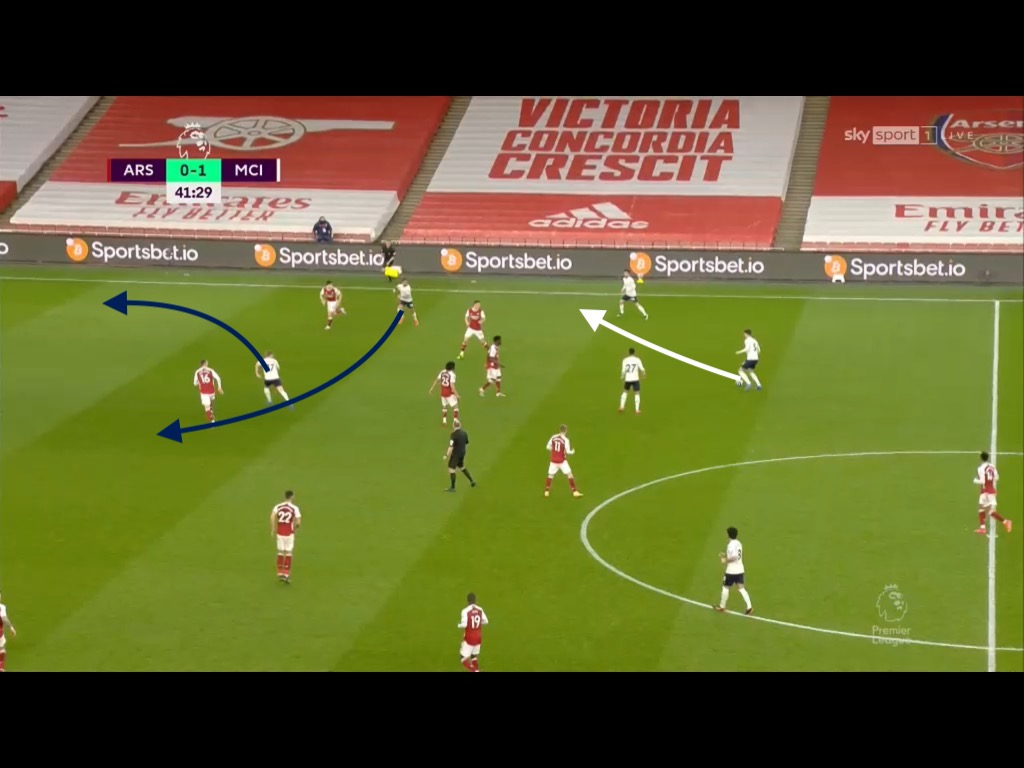 Even with that movement, Arsenal handled them well. City completed the fewest progressive passes (per StatsBomb via FBRef) they’ve managed in any Premier League game all season.
Even with that movement, Arsenal handled them well. City completed the fewest progressive passes (per StatsBomb via FBRef) they’ve managed in any Premier League game all season.
Even with Arsenal defending well, they adjusted again, allowing John Stones to push on from centre-back in a further attempt to create overloads again on the right.
 That aggressive positioning pushed Arsenal back, making counter-attacks almost impossible to spring from deep, and that’s something Arteta will want to work on before the teams next meet. The problem is, playing City demands bodies at the back, and if they’re all 70 yards from the opposition goal, it’s hard to break away.
That aggressive positioning pushed Arsenal back, making counter-attacks almost impossible to spring from deep, and that’s something Arteta will want to work on before the teams next meet. The problem is, playing City demands bodies at the back, and if they’re all 70 yards from the opposition goal, it’s hard to break away.
 Having stemmed the early flow, it was crucial Arsenal started to release themselves from pressure and show City they weren’t in for an easy ride against the ball.
Having stemmed the early flow, it was crucial Arsenal started to release themselves from pressure and show City they weren’t in for an easy ride against the ball.
“For 15-20 minutes it was so brilliant. After they were better than us, we could not press, we could not have the ball and they didn’t create much but there were crosses.” – Guardiola
“The moment we clicked, we did what we prepared, they found it difficult. We found really good spaces.” – Arteta
Arsenal exploited City’s use of Fernandinho as a lone central midfielder, knowing he couldn’t cover both Odegaard and Saka if they dropped on their respective sides of the midfield.
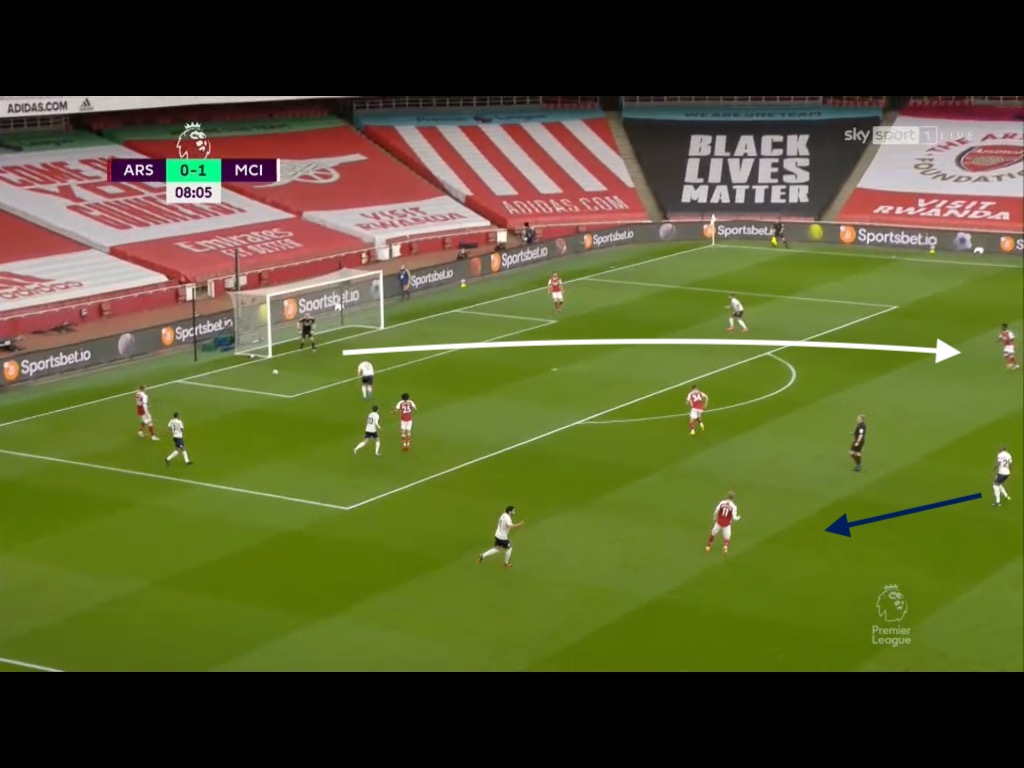 First Saka dropped, then Arsenal moved the ball back and to the other side instead, dragging Fernandinho across the pitch, at which point the Gunners exploited the space Saka was in, knowing Cancelo couldn’t track him closely and leave Tierney free on the wing.
First Saka dropped, then Arsenal moved the ball back and to the other side instead, dragging Fernandinho across the pitch, at which point the Gunners exploited the space Saka was in, knowing Cancelo couldn’t track him closely and leave Tierney free on the wing.
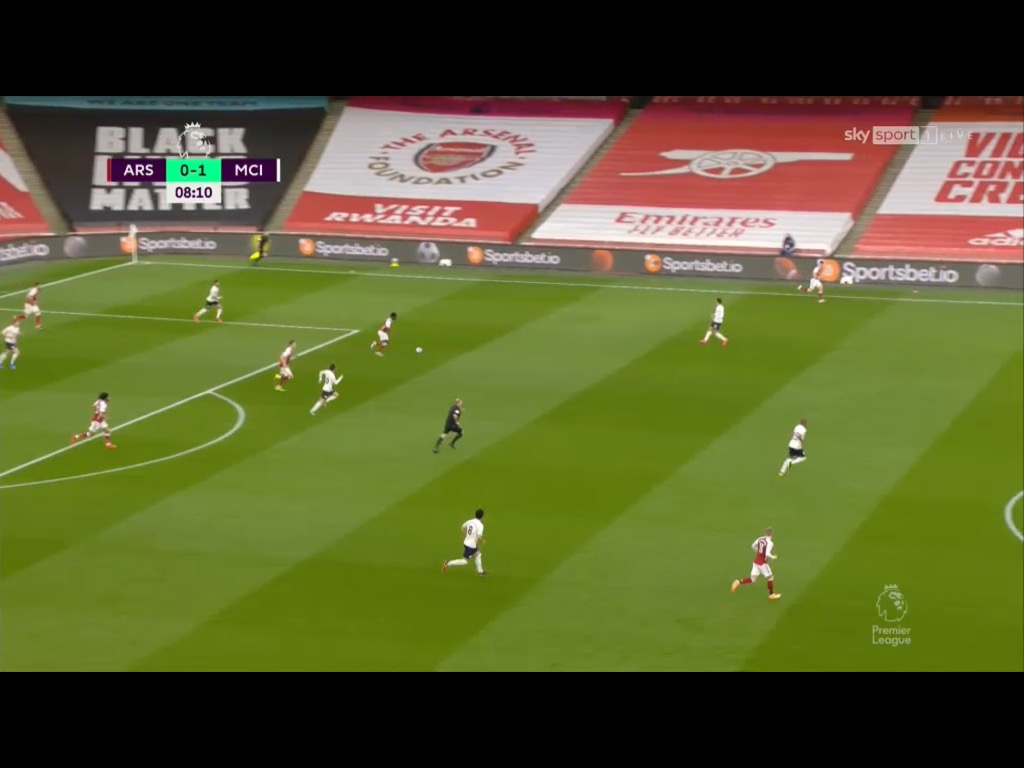 That was the first time Arsenal broke out of their half and they continued to cause City problems in pressing, with Saka and Tierney in particular leaving Cancelo with decisions to make.
That was the first time Arsenal broke out of their half and they continued to cause City problems in pressing, with Saka and Tierney in particular leaving Cancelo with decisions to make.

 And Arsenal continued to be brave when building up, dragging City on to them, taking risks, and then pouncing into the space. It’s a risk and it can backfire, but it’s also the best way to get beyond a team that presses high and hurt them and Arteta will be encouraged by, to use his word, the character his players showed.
And Arsenal continued to be brave when building up, dragging City on to them, taking risks, and then pouncing into the space. It’s a risk and it can backfire, but it’s also the best way to get beyond a team that presses high and hurt them and Arteta will be encouraged by, to use his word, the character his players showed.
Rob Holding was calm on the ball and excellent in waiting to commit a man (or two) before moving the ball on.
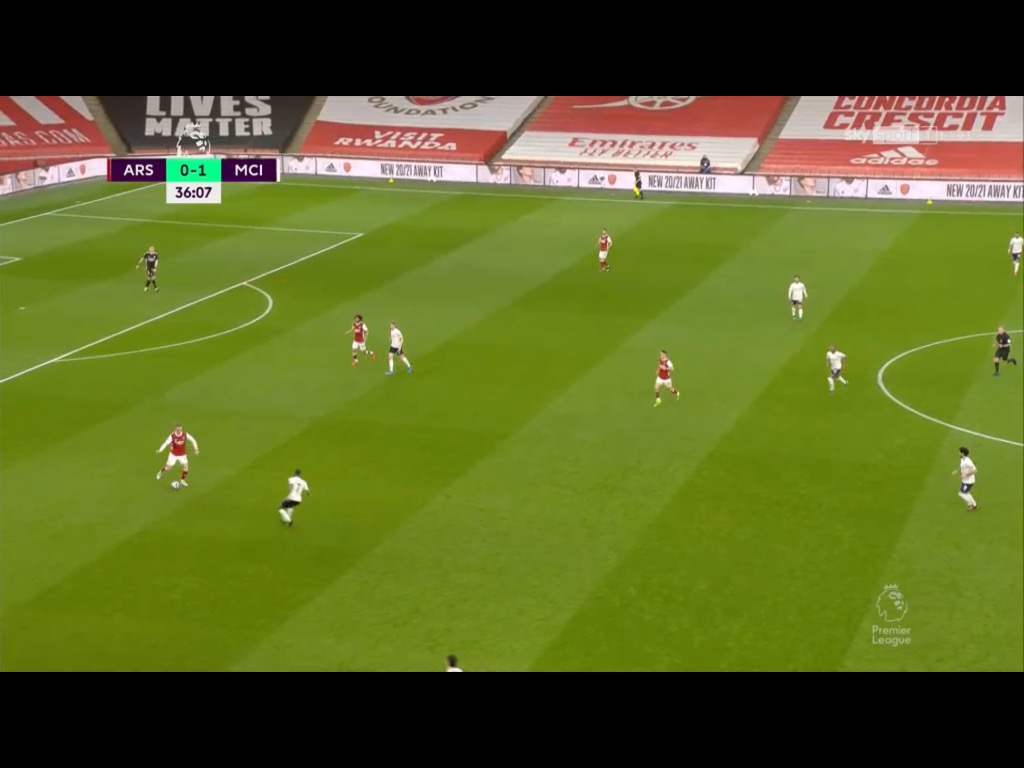 And Xhaka repeatedly found anyone who got themselves into space down the left, with Cancelo still not sure how to handle having more than one player to defend.
And Xhaka repeatedly found anyone who got themselves into space down the left, with Cancelo still not sure how to handle having more than one player to defend.
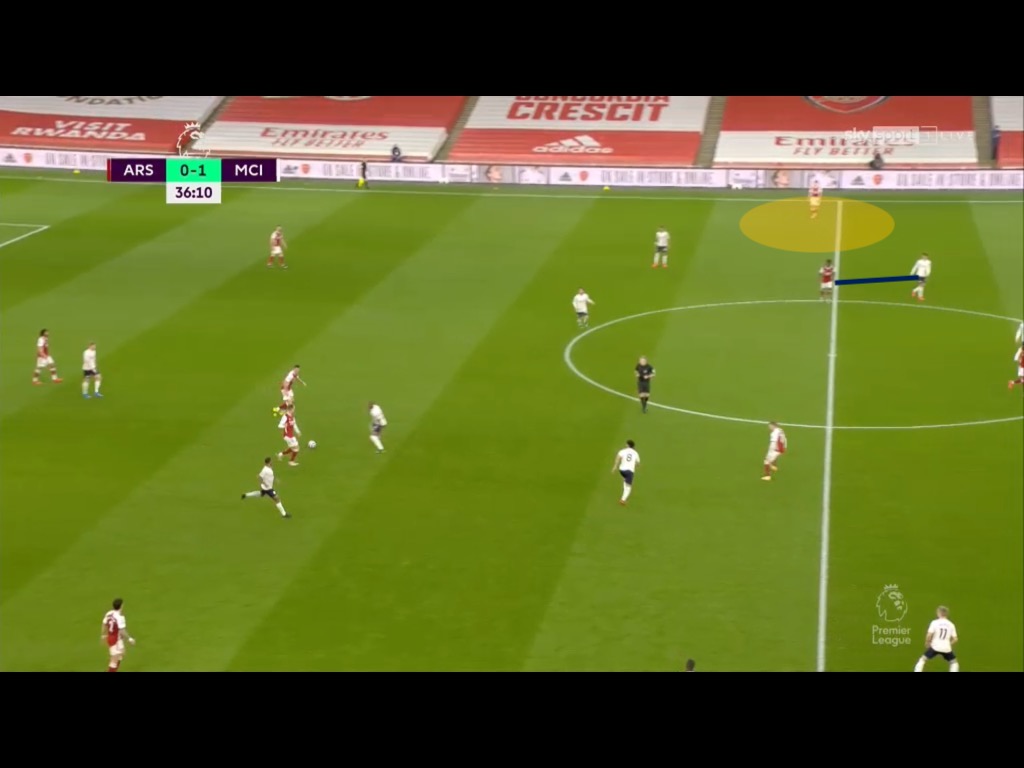 To underline how ineffective City’s pressing was, they managed a pressure in the Arsenal third every 14.6 touches Arsenal had in their own third of the pitch. That’s compared to one every 4.6 touches in the reverse fixture and City’s average of one every 6.6 touches so far this season.
To underline how ineffective City’s pressing was, they managed a pressure in the Arsenal third every 14.6 touches Arsenal had in their own third of the pitch. That’s compared to one every 4.6 touches in the reverse fixture and City’s average of one every 6.6 touches so far this season.
Guardiola and City don’t decide to play conservatively for no reason and they sat off like this because Arsenal were giving them problems.
“We adjusted our pressing in the second half. We didn’t create chances, but (we did) enough to win the game.” – Guardiola
Unfortunately for Arteta and his players, after a very strong end to the first half, City adjusted and really wrestled back control.
Ilkay Gundogan dropped deeper as City pressed, reducing the space Fernandinho was tasked with covering, allowing the Brazilian to stick closer to Saka, and in turn allowing Cancelo to focus more on Tierney.
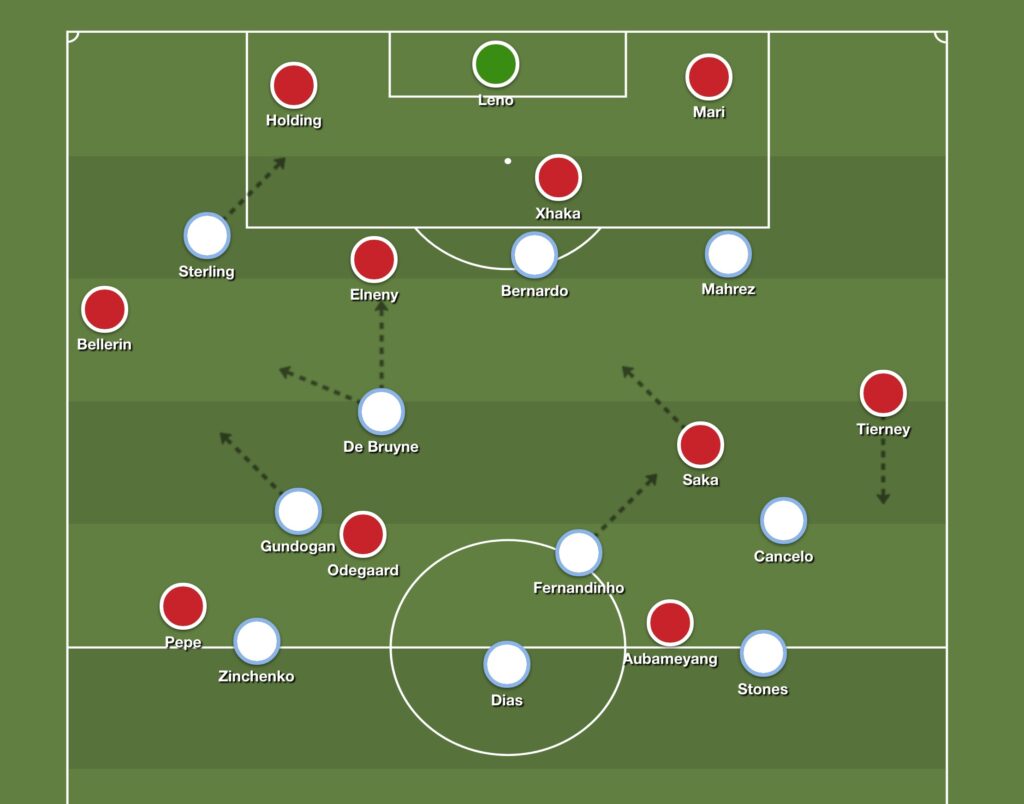 Instead of pressing to prevent a pass into Bellerin, Gundogan only moved to the Spaniard when the ball was played to him, to hurry his first touch and force Arsenal back.
Instead of pressing to prevent a pass into Bellerin, Gundogan only moved to the Spaniard when the ball was played to him, to hurry his first touch and force Arsenal back.
 The approach worked. Arsenal needed to take more risks and City managed six shots from the restart until the 57th minute and Arsenal had to, at some point, play a bit more carefully. You can’t come back from 1-0 down if you find yourselves 2-0 down.
The approach worked. Arsenal needed to take more risks and City managed six shots from the restart until the 57th minute and Arsenal had to, at some point, play a bit more carefully. You can’t come back from 1-0 down if you find yourselves 2-0 down.
Gundogan’s positioning protected City from counters better than in the first half and made them harder to play through from build up situations. Arsenal struggled for solutions.
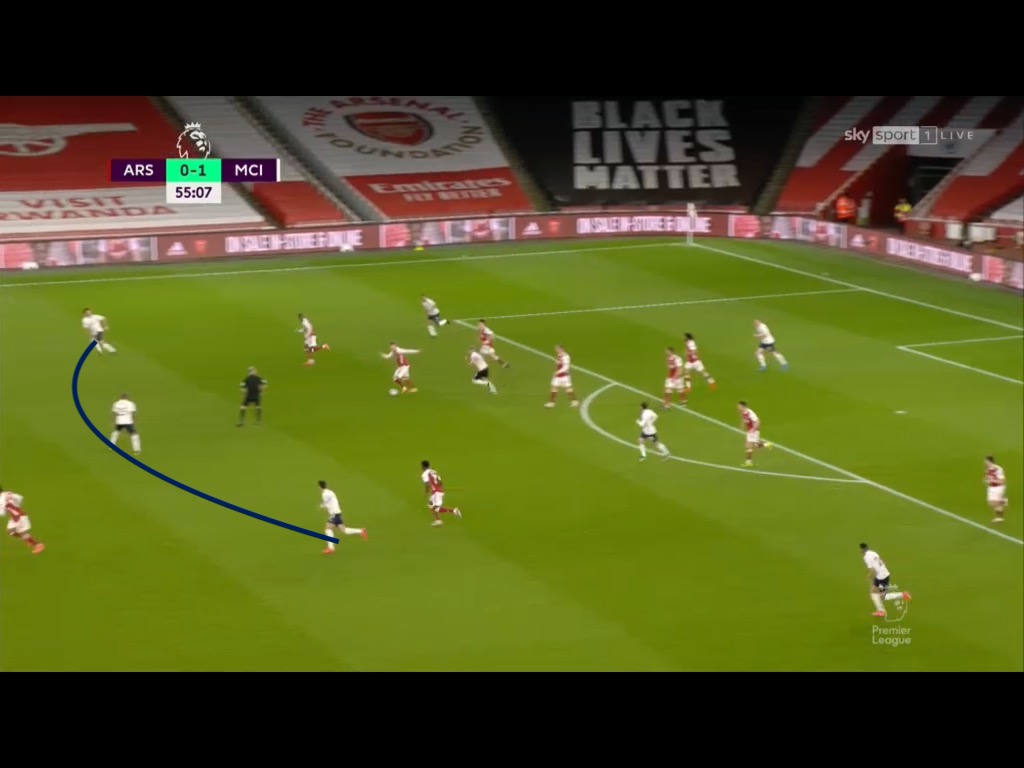
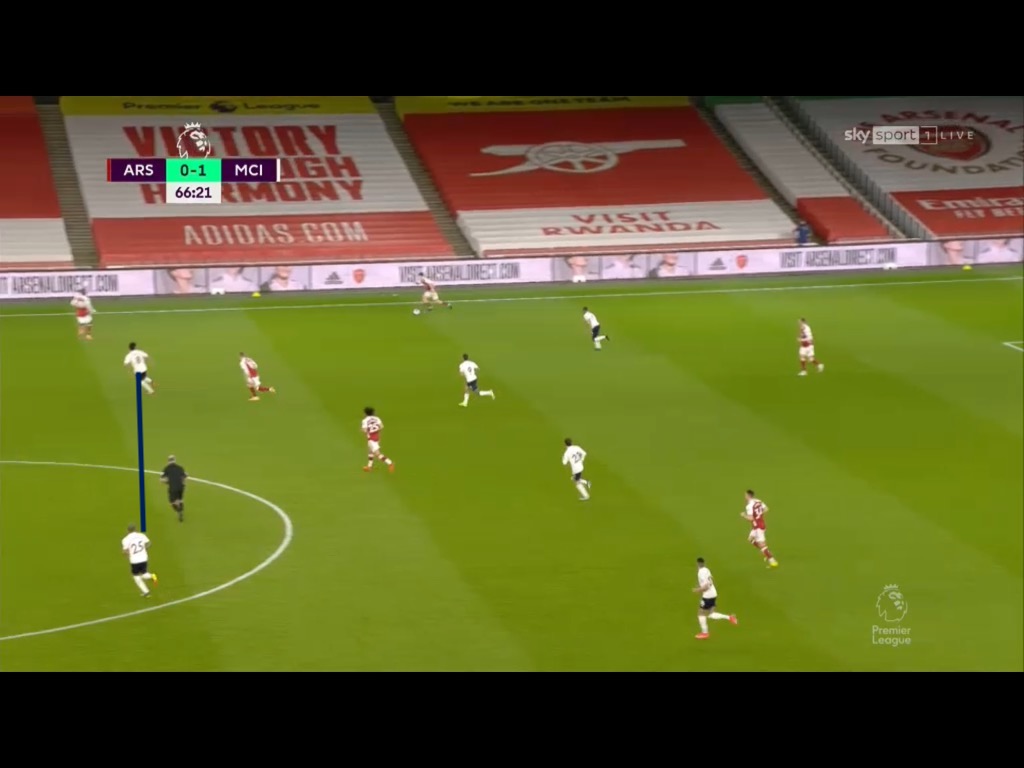 The Gunners still found Tierney in space but City now had enough players covering to outnumber any Arsenal attack.
The Gunners still found Tierney in space but City now had enough players covering to outnumber any Arsenal attack.
“When we were there, in the final third, we lacked the final pass.” – Arteta
Only one shot on target but that doesn’t mean Arsenal didn’t threaten.
The team’s 29 passes into the final third was the fifth most a Premier League side has managed against City all season. The champions elect have conceded more passes into the box (Arsenal managed nine on Sunday) in just two games all campaign.
There were a few nearly moments and you just have to make the most of those in a game like this.

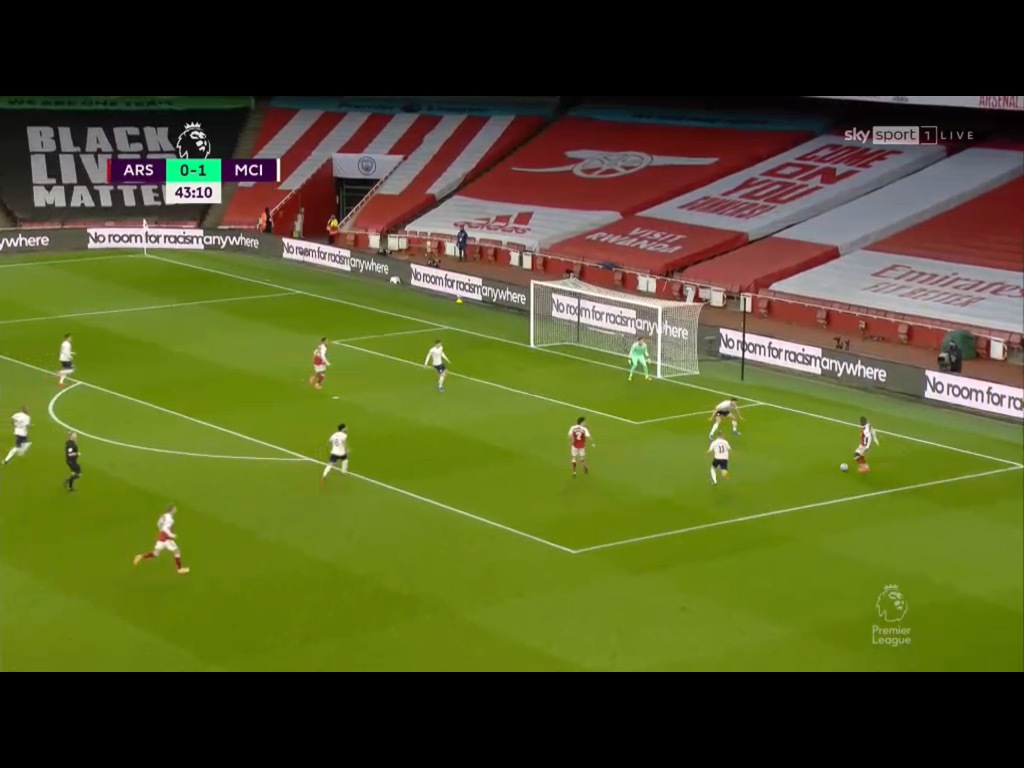
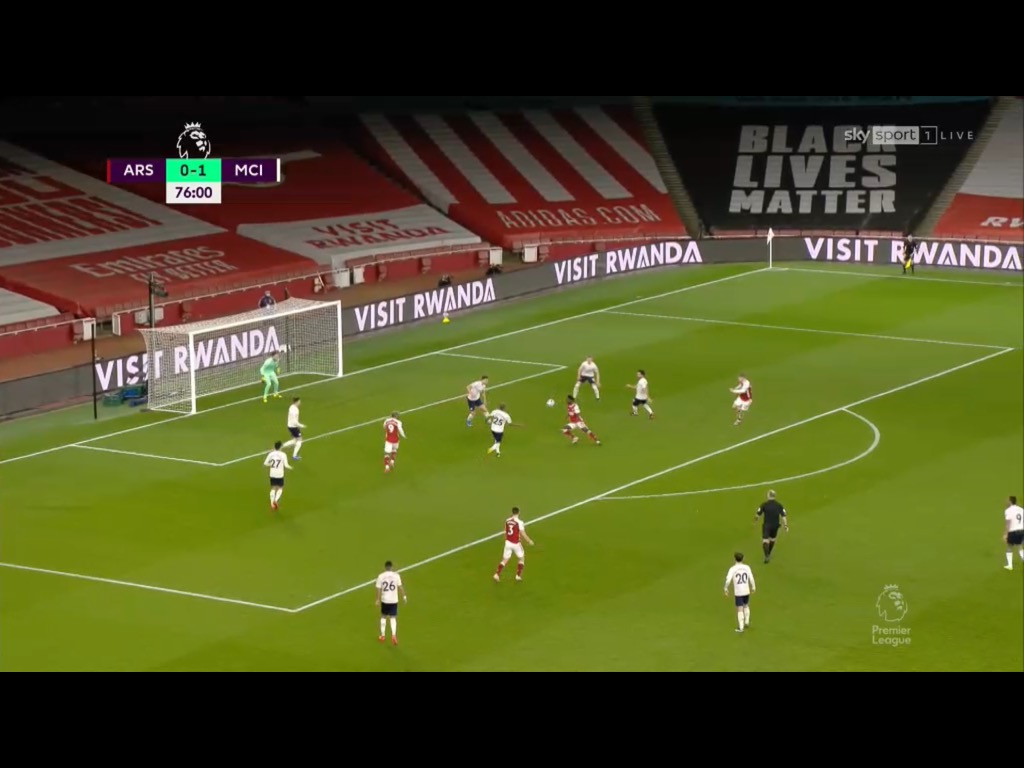 Those split second decisions or slips will have been going through Arteta’s mind on Sunday night. Two of them didn’t lead to a shot, one led to a blocked shot as Saka stretched after his own first touch and lost his footing. Don’t let the shot count fool you. Arsenal didn’t test Ederson but that doesn’t mean they didn’t threaten City at all.
Those split second decisions or slips will have been going through Arteta’s mind on Sunday night. Two of them didn’t lead to a shot, one led to a blocked shot as Saka stretched after his own first touch and lost his footing. Don’t let the shot count fool you. Arsenal didn’t test Ederson but that doesn’t mean they didn’t threaten City at all.
The final question, and not something either manager was drawn on after the game, is whether Arsenal went for it enough in the closing stages.
The frustration of fans is understandable; Arsenal didn’t really threaten in the final 10 minutes despite being a goal down, a repeat of the reverse fixture. Surely losing 2-0 is worth the chance of making it 1-1? I think we can all agree with that.
That doesn’t, though, appreciate that there are two teams deciding what happens.
Watching the game back, I didn’t see an Arsenal side making little effort to attack or settling for a narrow defeat. I saw players that, on their last legs, didn’t have the nous or quality to find their team-mates when they committed to an attack. As good as he can be, Tierney, simply, is very left-footed, which meant he didn’t attempt a forward ball in one situation and played it too late to really threaten in another.
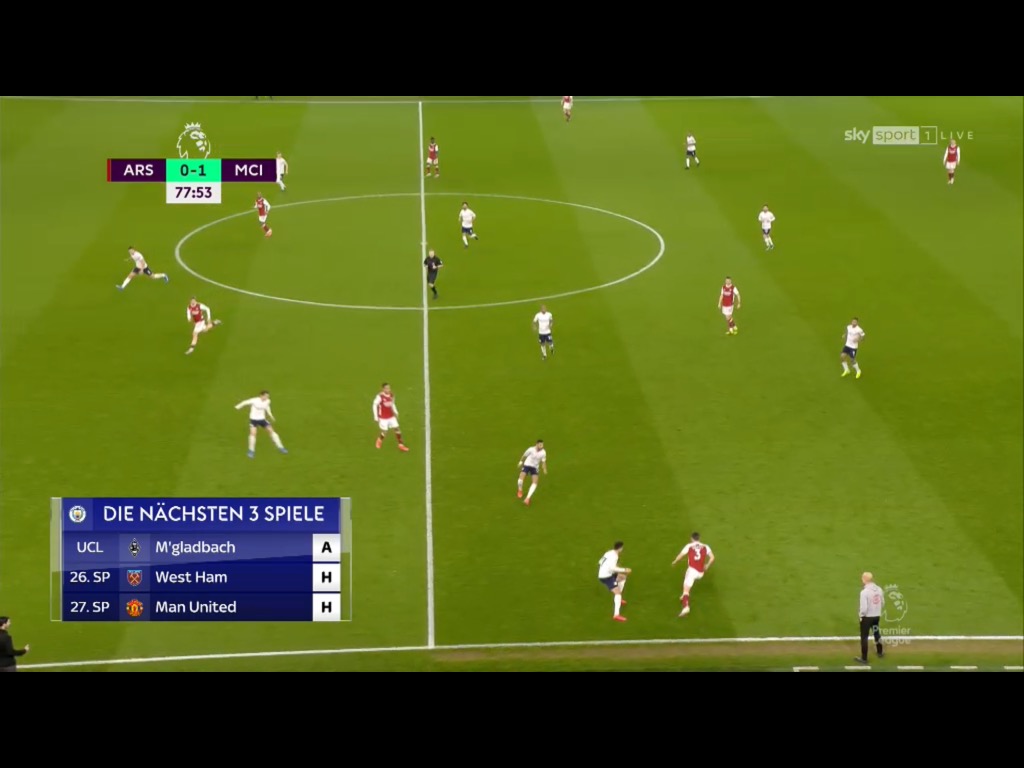
 Arsenal still tried to press high and force a turnover, but City just opted to go long, making sure that, if Arsenal did win the ball, it would be at the other end of the pitch.
Arsenal still tried to press high and force a turnover, but City just opted to go long, making sure that, if Arsenal did win the ball, it would be at the other end of the pitch.
 And when a chance did look like it might present itself, City defended in numbers and did enough to snuff out the danger.
And when a chance did look like it might present itself, City defended in numbers and did enough to snuff out the danger.
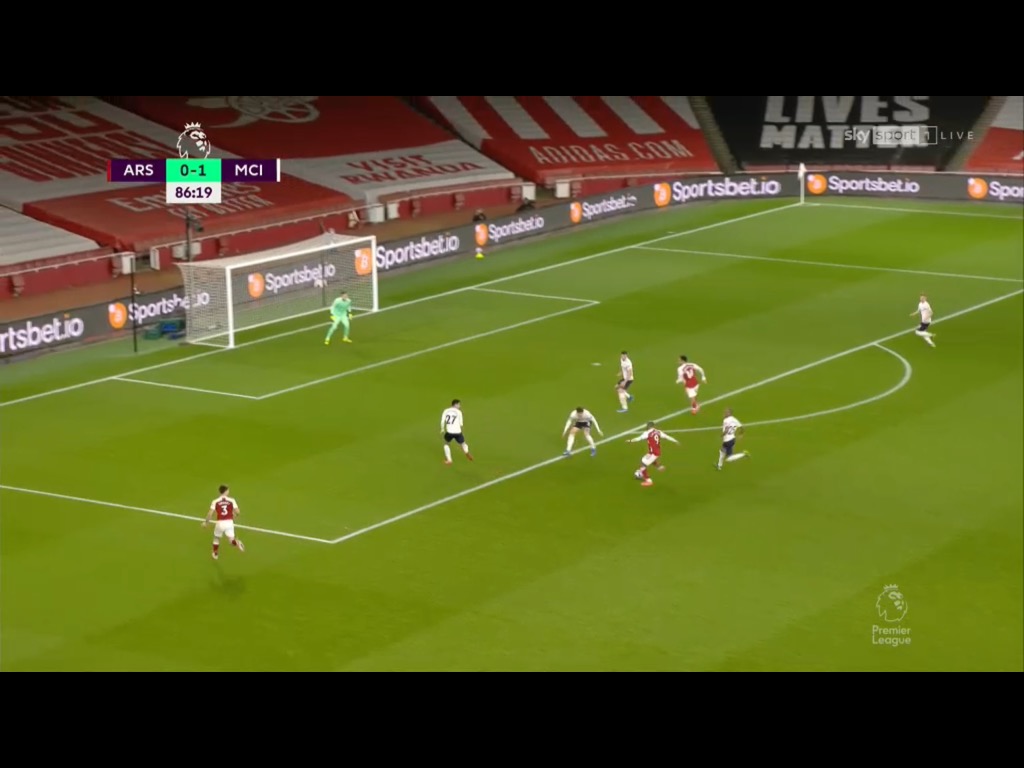 The closing stages didn’t feel like a matter of intent but of one team that is, right now, a lot better than another team, preventing them from creating any chances.
The closing stages didn’t feel like a matter of intent but of one team that is, right now, a lot better than another team, preventing them from creating any chances.
Arsenal came up against a side that has conceded two goals from open play in their last 17 Premier League matches. Scoring against them is more than a matter of wanting to and trying hard enough.
All in all, from the early adjustments made to stem the threat on the right and the ability to keep Cancelo quiet to the impressive build up play and space Saka found in transition, Arsenal can be proud of their performance against a side that looks truly unstoppable.
Arteta’s side are still in mid-table and this season has been a disappointing one but things are improving. It just takes time.

